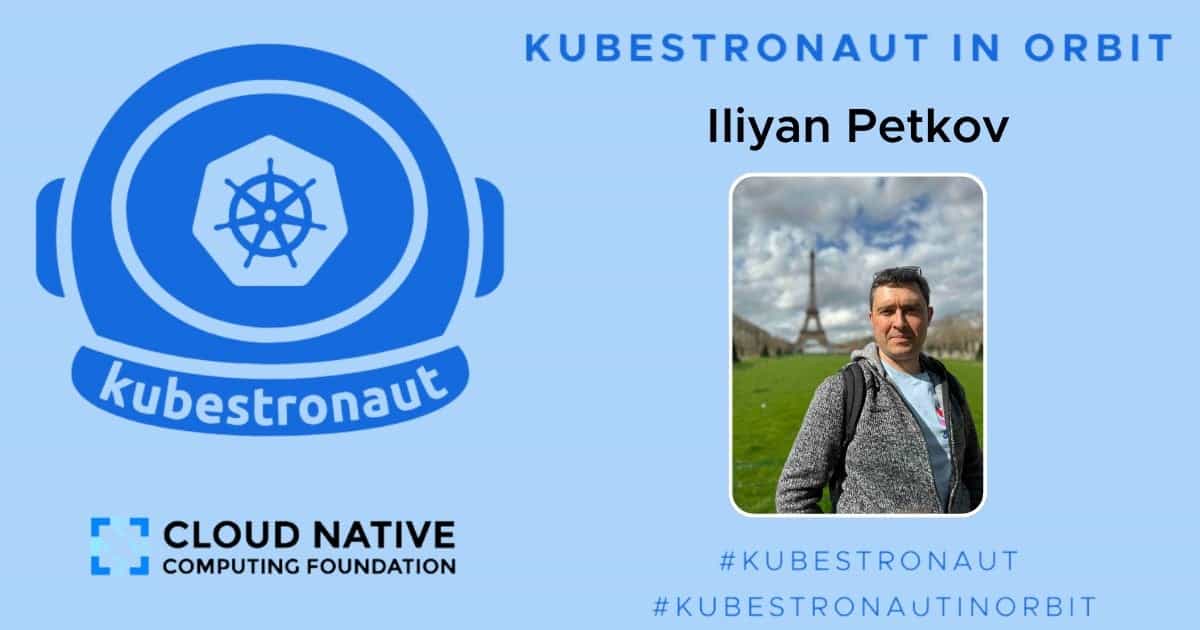
Get to know Iliyan
His fascination with computers and electronics began early, sparked by his father and fueled by various games and sci-fi movies. Over the years, he developed a passion for open-source technologies, system administration, DevOps, programming, and sharing knowledge through teaching. This journey naturally led him to container technology and Kubernetes, becoming one of the first Kubestronauts in Bulgaria and Eastern Europe. In 2022, together with a close friend and fellow Kubestronaut, he founded a company driven by a shared vision of knowledge sharing, engineering excellence, and innovation. In addition to teaching classes on Kubernetes and various cloud technologies, he actively engages in project work and consulting, guiding organizations through their cloud native journeys. He believes in the power of community and regularly participates in meetups and conferences, both as an attendee and occasionally as a speaker.
When did you get started with Kubernetes and/or cloud native? What was your first project?
While I had been working with containers for some time, I began experimenting with Kubernetes in 2019. My first major Kubernetes project came in 2020, when I led a small team tasked with building a large-scale internal cloud platform based on Kubernetes. This project presented numerous challenges related to scalability and reliability, but it was an invaluable learning experience that truly ignited my passion for Kubernetes.
What are the primary CNCF projects you work on or use today? What projects have you enjoyed the most in your career?
Depending on the specific use case and challenge, I frequently leverage multiple projects from the Kubernetes ecosystem. Beyond Kubernetes itself, I primarily use Cilium as my CNI solution, Harbor for container image registry management, and Prometheus paired with Grafana for comprehensive monitoring and alerting. I also regularly work with ExternalDNS, Cert-Manager, OPA, Helm, OpenEBS, and Longhorn. The project I enjoy the most is Kubernetes. It is vibrant and dynamic, constantly adapting to the latest trends and industry challenges, and it has an incredible community around it.
How have the certs or CNCF helped you in your career?
I enjoy learning new technologies and taking exams, though not necessarily to advance my career. I often use the goal of passing a certification as an “excuse” to spend more time diving into a new project or gaining a deeper understanding of technology that interests me. In a way, I’ve come full circle—from taking Kubernetes-related exams to assisting with beta tests of new exams like KCNA and KCSA, and eventually volunteering to help develop new CNCF exams. I also appreciate the social aspect of certifications, as they allow me to meet like-minded people. Through the CNCF Kubestronaut program, we’ve built a small community that meets periodically in person. From a practical standpoint, preparing for and taking exams helps me stay current with the latest trends and enables me to support others in passing their certifications. Additionally, my certifications help build trust and confidence in my business partners, who rely on me to provide professional support for their projects.
What are some other books/sites/courses you recommend for people who want to work with k8s?
The Kubernetes documentation is excellent—huge kudos to all contributors and tech writers! Although I enjoy reading books, I rarely have the time to finish them cover to cover. Instead, I often watch YouTube recordings of talks from conferences like KubeCon, as well as video training on platforms such as Udemy. Early in my Kubernetes journey, the outstanding trainings by Mumshad Mannambeth for the CKA and CKAD, along with the excellent CKS course by Kim Wüstkamp (founder of killer.sh), which is now also freely available on YouTube, were incredibly helpful to me. I highly recommend attending conferences and local community meetups, as they provide great opportunities to connect with and learn from leading experts. Additionally, the CNCF Slack community has channels for certification-related discussions, CNCF projects, and initiatives where I have picked up many valuable tips and tricks.
What do you do in your free time?
Outside of work, I enjoy training in Aikido, mountain biking, running, and exploring new places with my family. I also enjoy tinkering with electronics, home automation, and IoT, trying out new open-source projects, and furthering my curiosity in AI/ML.
What would you tell someone who is just starting their K8s certification journey? Any tips or tricks?
I like to approach Kubernetes certifications with a positive mindset, viewing them as challenges to solve within a limited timeframe. Maintaining a positive attitude significantly reduces stress during the exam. Of course, failure is always a possibility, but I see it as a valuable learning opportunity to identify and address knowledge gaps before taking advantage of the free retake offered with Kubernetes exams. Good preparation before the exams is essential. I consistently stay updated with the latest exam curriculum, as the exams evolve alongside the technology. The CNCF’s official exam tips and tricks guide, along with its documentation, are invaluable resources. Additionally, numerous blog posts provide practical advice for optimizing productivity during the exam. The more you practice, the more confident you will become. Fortunately, setting up Kubernetes environments for practice is incredibly easy using Kind or Minikube on your local machine (or even a Raspberry Pi), or by leveraging cloud-based platforms like Killercoda and killer.sh, which provide realistic lab scenarios.
Today the cloud native ecosystem is way more than Kubernetes. Do you plan to get other cloud native certifications from the CNCF?
Absolutely! This year, I plan to pursue certifications in Argo, Cilium, Istio, Kyverno, and OpenTelemetry.
What else would you like to share in this feature?
I want to express my gratitude to the CNCF community and everyone who has supported me along my journey. Sharing knowledge and helping one another is what makes this community truly special! Learning is not a one-time challenge, but an ongoing process. As the famous quote goes: “Stay hungry. Stay foolish.”